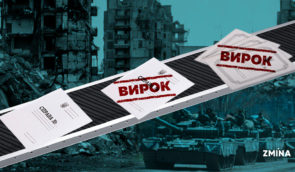Four Ukrainians in Crimea may be imprisoned for expressing their thoughts
Currently, in Crimea 4 criminal cases related to freedom of speech and expression are conducted against Ukrainians who live on the occupied peninsula.
In addition, a number of other cases of freedom of speech and expression violations were documented: interrogations, detentions, searches, mass media blockages on the internet, denial of access to information, prohibitions on filming and other cases that show pressure against journalists and bloggers and.
Such data was presented in the monitoring report for the first quarter of 2017 prepared by the Human Rights Information Centre.
LEARN MORE – OVERVIEW
Criminal proceedings concern four cases.
The case of Natalia Kharchenko. On 12 January 2017, at about 7 a.m., as part of a pre-trial verification six FSB officers searched the apartment of wife and husband, Natalia Kharchenko and Andriy Vynohradov in Simferopol. As a result, 4 computers were seized. After this, the officers of the FSB Department for the Republic of Crimea transported Natalia Kharchenko for an interrogation as part of pre-trial investigation upon suspicion of a criminal violation under Article 280 of the Criminal Code of the Russian Federation for alleged extremist posts in the VKontakte network. Upon interrogation, she was requested to sign a non-disclosure pledge. The lawyer who represents Kharchenko’s interests, was not allowed to see her.
The case of Suleyman Kadyrov. On 18 January 2017 member of the regional Medjlis of the Crimean Tatar People in Feodosia, Suleyman Kadyrov, was summoned to FSB. It is noteworthy that in October 2016 it became known that Kadyrov was facing a criminal case under part two of Article 280.1 of the Criminal Code of the Russian Federation – “Public calls to action aimed at violating territorial integrity of the Russian Federation made through media, electronic or information-telecommunication networks (including the internet)”. As a part of the case, linguistic expert assessment of the video-appeal made by Demyan Demyanchenko and the comment of Mr. Kadyrov thereto was conducted.
In January 2017, an FSB investigator allowed Kadyrov and his lawyers to see the results of the linguistic expert assessment. According to it, the words of Suleyman Kadyrov were not a call to action but were rather an approval of the action by the Crimean Tatar battalion “Asker”. At the same time, the investigators did not agree with this conclusion and launched an additional psychological-linguistic expert assessment.
The case of Mykola Semena. On 20 January 2017, FSB investigator, Oleksandr Parshutin, handed over the indictment to journalist, Mykola Semena. The journalist is accused under part two of Article 280.1 of the Criminal Code of the Russian Federation (Public calls to action aimed at violating territorial integrity of the Russian Federation). In February 2017 court trial started.
The investigative side believes that the Crimean journalist “drafted an article “Blockade – the necessary first step to freeing Crimea” that contained calls to violation of territorial integrity of the Russian Federation”. The indictment is based on the results of linguistic expert assessment. The journalist is still in Crimea under a travel ban.
The case of Ilmi Umerov. Ilmi Umerov is accused of actions under part two of Article 280.1 of the Criminal Code of the Russian Federation – “Public calls to action aimed at violating territorial integrity of the Russian Federation made through media, electronic or information-telecommunication networks (including the internet)” for his public statements that Crimea is territory of Ukraine.
As of 27 March 2017, the territory of Crimea faces blockage of 10 websites: Krym.Realii, Centre for Journalist Investigations, Blackseanews.net, 15 Minut, QHA, Krym-SOS, Ukrayinska Pravda, Hromadske Radio, UAinfo, STB TV-channel website. At the same time, the verification found out that the previously blocked websites of Sobytiya Kryma, Obozrevatel, Apostrof and Censor.net were accessible.




